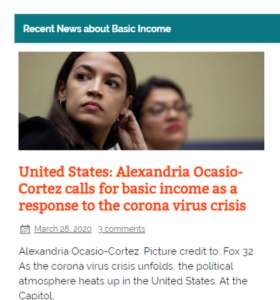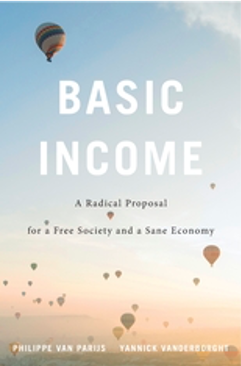Dear Colleagues,
I’m not an economist, I’m not a lawyer.
I’m only passionate about debates on social, political and economic issues.
And I wonder about which kind of world my kids will have to live in.
This is why I’d like to talk a little bit about a controversial subject, to see if there is an appetite for discussions and exchanges.
Basic Income.
These two words are quite popular in these times of Covid-19, when trying to imagine how to overcome the economic problems our societies are already facing, due to the slowdown of activities all over the world.

Even in the US, Alexandria Ocasio-Cortez demands the government to distribute a universal basic income and implement ‘Medicare for all’ to fight the coronavirus.
So, what is this Basic Income?
Cash payments (rather than in-kind transfers) made to individuals (rather than to households) on an unconditional basis (as opposed to being tied to a means test or work requirement).
“The goal of such programs is to provide a guaranteed minimum level of income to all persons, thereby giving them the freedom to say “no” to unattractive and potentially exploitative offers of employment, and the freedom to say “yes” to any number of other pursuits, whether it be staying home to raise a family, pursuing the life of an artist, or simply surfing the beaches of Malibu.”
Awesome!
But who pays for that?
And overall, is it fair?
“Why, after all, should hardworking laborers have some of their wages taken away to support surfers who eschew work to pursue their hobby?”
“For starters, many people under our current system do not face any requirement to make a contribution to society—namely, the rich. If reciprocity is such an important political norm, why is it only a problem when the poor are able to enjoy leisure without working? More fundamentally, why assume that the only form that a social contribution can take is paid labor in the marketplace? Artists, parents, homemakers, and many others make a vitally important social contribution, for which they are often financially compensated either poorly or not at all. A UBI that provides these individuals with a minimum level of income will arguably make things more fair with respect to considerations of reciprocity, not less.”
And is it really feasible? And how?
If you are interested in finding answers to these (and many other) questions, I suggest you to read this book (from which the above quotations come): Basic Income: A Radical Proposal for a Free Society and a Sane Economy by Philippe van Parijs and Yannick Vanderborght
 Here you find a short but really well done review of the book https://www.ethicsandinternationalaffairs.org/2017/basic-income-van-parijs-vanderborght/
Here you find a short but really well done review of the book https://www.ethicsandinternationalaffairs.org/2017/basic-income-van-parijs-vanderborght/
Other interesting link if you want to know more about Basic Income.
https://basicincome.org/ the Basic Income Earth Network
https://www.youtube.com/playlist?list=PLkzjbW_sNXE_fywK-iKQ0HJF_DcMRQTNG four videos du Mouvement Français pour un Revenue de Base
I’d like to conclude with the words of Philippe van Parijs, the author of the book.
“The possibility of society granting an income to people who make no effort to receive it is considered morally reprehensible by large sections of both the right and the left. But if we look at the UBI [Universal Basic Income] in a little more detail, we can see that it corresponds to a third generation of social subsidies: the first one appeared in certain Flemish and German cities during the 17th century and was exclusively an assistance for the poor; the second one was set up by Bismarck in Germany and had the character of solidarity among workers; and the third generation of social income, to which the UBI belongs, considers these as a dividend for the social wealth accumulated over generations and which, therefore, should be distributed to the whole of society. The value behind UBI is therefore justice, not charity or solidarity.”
“I came to this idea of the UBI at the beginning of the 1980s when unemployment began to become massive and it was intended to be combated through the incessant increase in production, an ecologically unsustainable proposal, or with the old recipe of state ownership of the means of production, which, in real socialism, ended freedom and did not achieve the end of inequality.
The UBI offered an alternative to neoliberalism and state socialism, because it allowed people to free themselves from both market subjection and state submission, it was environmentally friendly and very radical and inspiring, it promised a utopia for the future that people were passionate about”